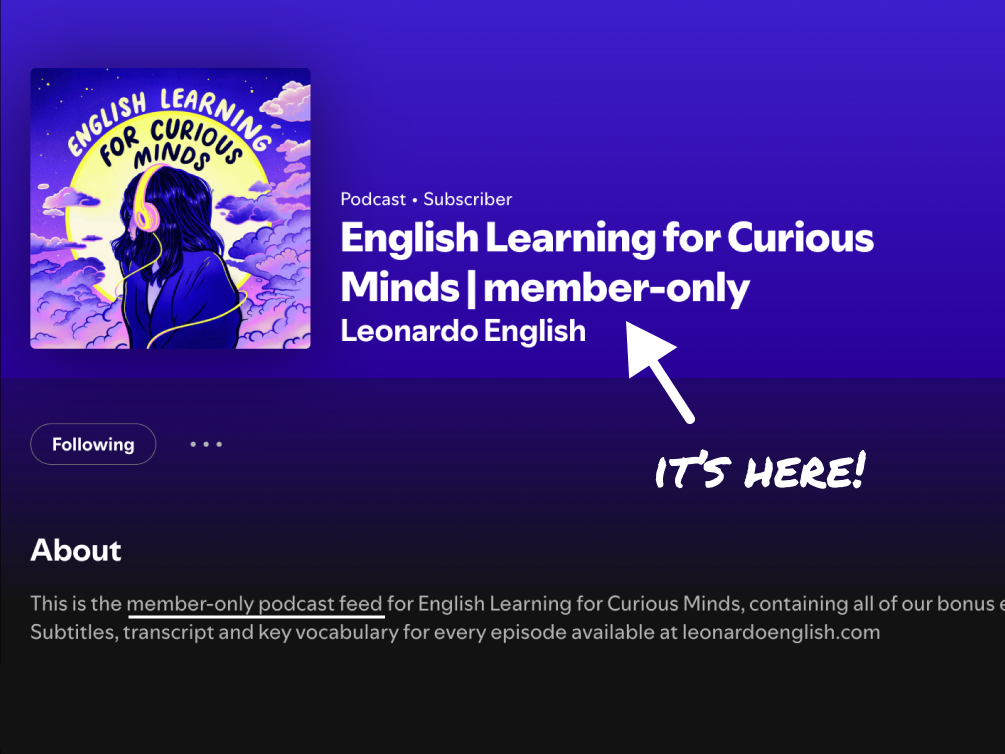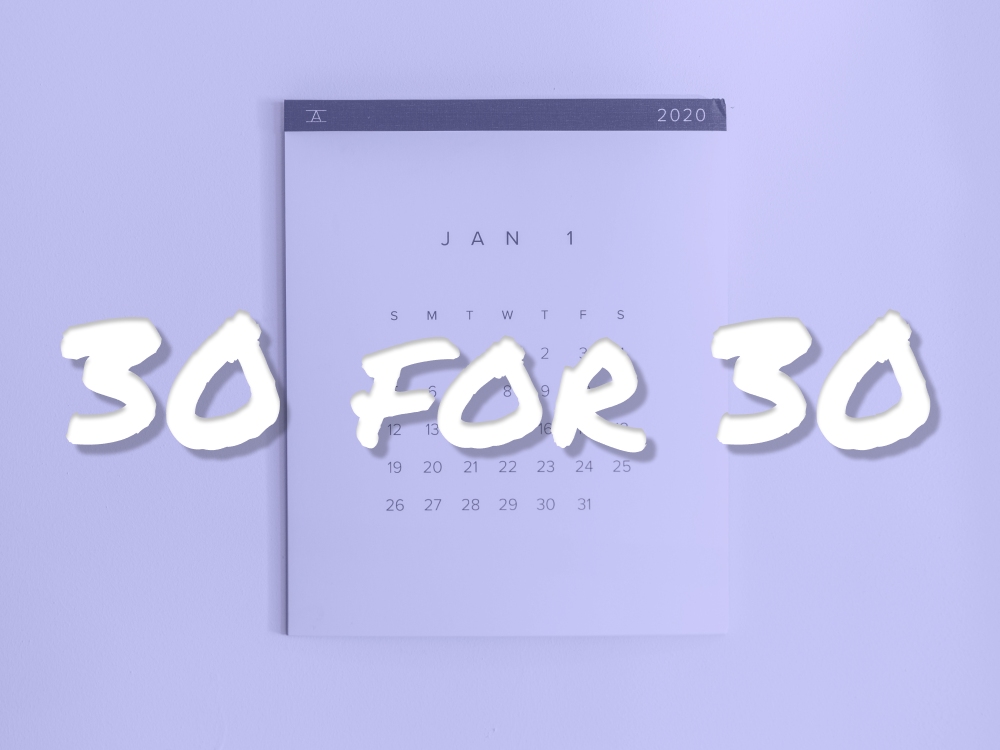Table of contents
At Leonardo English, we make podcasts for English learners with a curious mind, for people who are curious about the world, and want to learn fascinating things about how it works while also improving their English.
We're often asked about the most effective way to use the podcasts. So here are our top 8 tips on how to use them to maximise your learning.
If you want, you can just listen to the podcasts like you would listen to any other podcast.
They are all full of interesting expressions that you can use in your daily life, and they will all tell you about something new and interesting that you (probably) didn’t know before.
So you’ll listen to one and end up knowing more than before, even if you are just listening ‘passively’.
What do we mean by passively?
Well, passively means you are listening for enjoyment, and you are likely doing something else as you listen. Maybe you’re driving, you’re at the gym, or on the bus on the way to work. We get it, everyone is busy.
But, from a linguistic point of view at least, if you are really looking to ramp up your learning, then there are a few things that you should do.
These tips will help you go from being a ‘passive’ learner to being an ‘active’ learner, and will mean that you end up making far quicker progress than you would have done by listening passively.
Bonus tip: Here's our guide on Active vs. Passive Language Learning
You will likely improve by 2 to 3 times as fast, but these tips require a lot more effort than just listening passively. The choice is yours to make, but if you are really serious about improving your English then these are the best things you can do.
8 tips for improving your English with podcasts
1. Listen first without the key vocabulary or transcript
Try to listen to the entire podcast without opening the key vocabulary or transcript. This will force you to really understand what has been said from a contextual point of view.
Languages all rely on ‘context’, meaning that you don’t always have to understand every word in order to understand the meaning of what someone is saying.
You can note down words that you don’t understand as you go along. Sometimes you will find that just by writing them down you will realise what they mean.
Rate yourself on a scale of 1-10 of 'how difficult was it to understand this podcast?'. See how you progress with time.
2. Write a summary of the podcast
Write a summary of what the podcast was about. What were the key arguments? What new things did you learn? Did you agree with everything that was said?
Try to use slightly different structures to express the same idea.
For example, if the speaker of the podcast said “The moon, sun and stars have of course captivated the minds of philosophers since the beginning of time”, think about a different way of conveying the same idea. For example, “the stars above have long held a strong allure for philosophers”.
Why is this important?
Firstly, it’s about comprehension. If you can accurately summarise everything that has been said, this means that you have understood the gist of the podcast. If you didn’t understand every word, this is ok, as long as you have understood the main points.
Secondly, it gives you the opportunity to use any new pieces of vocabulary, sentence structures, or expressions that you heard used in the podcast. It’s only through practicing these expressions yourself, and contextualising them that you will be able to commit them to memory and be able to reuse them yourself.
3. Use the key vocabulary and transcript
The key vocabulary and transcript are there as a crutch, as something for you to fall back on when you don’t understand something.
The vocabulary is there in case there is a word you might not understand. Words that are in the key vocabulary section are highlighted in the transcript.
The transcript can help you follow the speech. If there’s a word that you can’t understand, check the transcript before looking at the key vocabulary. Perhaps it is just pronounced in a way you weren’t expecting.
You should only really use the key vocabulary section if you can’t understand a word in the transcript.
4. Download the audio as well as the key vocabulary and transcript
There are downloadable versions of the audio, the key vocabulary and the transcript. If you are going offline - let’s say you are listening on the metro, you’re getting on a plane, or maybe you are going camping in the middle of nowhere.
You can download everything to your phone, tablet, or computer, so that you can listen offline.
Some learners find it easier to download the transcript and key vocabulary and print it out, so that they aren’t always looking at it on their phone.
This way you can also annotate it - circle words you don’t understand so that you can come back to them. Underline phrases that you want to reuse. The transcript is there for you to make use of.
5. Make your own vocabulary list
Any good language student should have their own little black book of vocabulary, expressions, and phrases. If you don’t have one already, then go and buy one today. It doesn't need to be anything more complicated that just a notebook you can keep in your pocket at all times.
This book is where you should write down every new piece of vocabulary, expression or structure. How you categorise it can be up to you, but I actually like to keep mine relatively unorganised - new words or expressions just go in chronological order, and I also write entire sentences in there to practice using them immediately.
Make sure that you review this vocabulary book on (at least) a weekly basis, and try to put every new word or expression into use that week. Without sounding like a broken record, it’s only through practicing using these phrases that you will actually improve.
Note - if you want to go 'high-tech', we have a step-by-step on how to build your own vocabulary app.
6. Transcribe the podcast
This takes time, but is an excellent skill and will pay dividends. Before you look at the transcript provided, try to write your own transcript. You will probably need to pause as you go along, but that’s nothing to be worried about.
If you have access to a laptop, then try transcribing it on a keyboard, as this will mean you can write more quickly.
You should then go and compare your transcription to the transcription provided. How did they differ? If you got a word wrong, or you didn’t manage to catch that word, why do you think that was? Listen to the word again, and practice saying it yourself.
7. Read the transcript aloud
This might sound like a strange thing to do, but listening is a vital component of being able to speak properly, and improve your English pronunciation.
Take the transcript and read it aloud.
If you can, record yourself doing it. Pretty much every smartphone has an inbuilt recorder in - no need to worry about anything more professional than that.
Then listen to yourself over again, and compare this to how expressions were spoken by the native speakers in the podcast.
What was different?
If there are differences, make sure you go back over and over again and record yourself saying that word or expression again. Don’t just listen to it and think ‘ah ok, that’s how I should do it next time’. It’s only through practice that you will actually remember.
8. Ask the Leonardo English team
We are here to help. If you have questions about anything in the podcasts, or would like our feedback on anything, then ask. If you don’t ask, then we can’t help. But if you do ask, then we will definitely do our utmost to help. You can email us at hi@leonardoenglish.com
Good luck! If you follow these tips you will really surprise yourself with how quickly you improve. Colleagues, classmates, and family members will be surprised and be asking you how you did it.
Remember though, there are no shortcuts. Learning a language is hard, and the harder it feels, the more you are learning. If it feels like a game, or you are doing other things while you listen, you probably aren't learning as effectively as you could be.
Best of luck on your journey with Leonardo English, and we will be here to help you on your way.
Alastair & the Leonardo English team.




